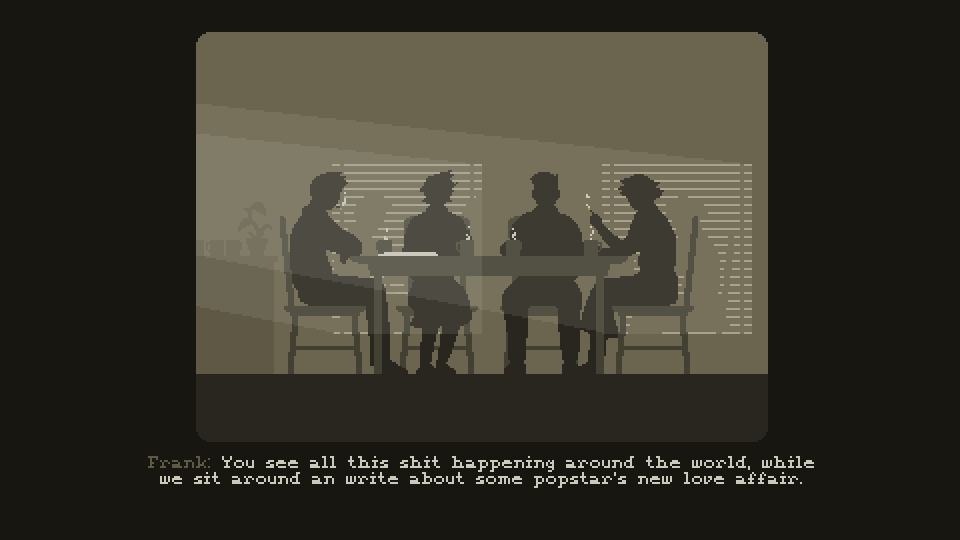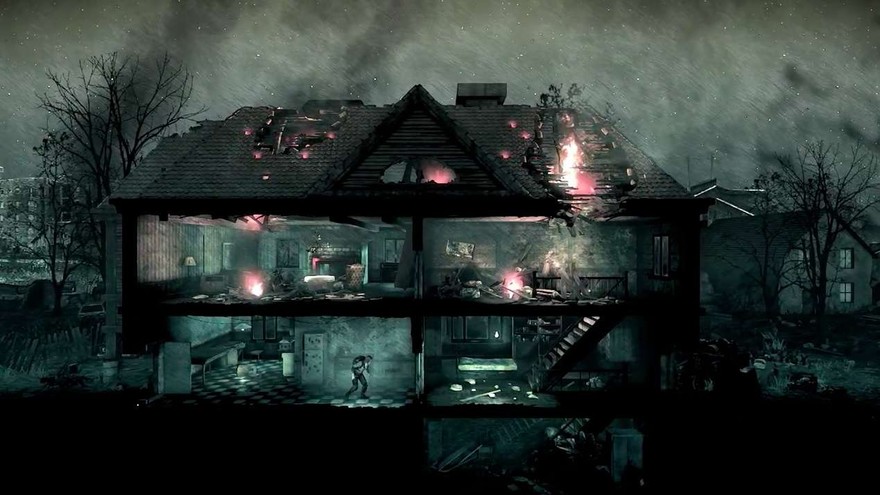We only notice the quotidian—the mundane routines of our lives—when something breaks it. When Gregor Samsa in Franz Kafka’s “The Metamorphosis” awakes one morning to find that he has been transformed into a monstrous vermin, his first thoughts are not about the unimaginable horror of his situation but rather that it will make him late for the train. “‘Oh, God’, he thought, ‘what a strenuous career it is that I’ve chosen! Travelling day in and day out. Doing business like this takes much more effort than doing your own business at home, and on top of that there’s the curse of travelling.’” It is not the horror of being turned into a giant beetle that makes Kafka’s story so affecting and Gregor’s condition so heart-wrenching, it is this attention to everyday life and how it can be shattered, seemingly at random.
For all their graphical aspirations towards realism, games have tended to shy away from the everyday realities of life. For many their whole purpose is to stop you from thinking about it at all. When you enter the world of a game like Far Cry 4 you do so in the expectation that you’ll escape worries such as indigestion or sweaty commutes and find yourself in a series of constantly exceptional situations: riding elephants into jeeps, being hounded by eagles. On the other end of the spectrum you have games like The Sims which take the everyday and idealize it, systematize it and neaten it into something which can be managed and mastered. In both cases the quotidian simply is or isn’t there and the player isn’t expected to question her part in it. This is fine for your standard power-fantasy, but a growing number of game developers are problematizing the everyday worlds of their games, probing our expectations of the day-to-day lives of videogame characters in increasingly complex ways and using it to hold a mirror up to our own daily routines.

That Dragon, Cancer traces Ryan and Amy Green’s memories of raising their son Joel, who was diagnosed with terminal cancer at twelve months of age. Described by Ryan Green as “a script written day by day,” the game centers on personal, daily experiences. While many elements of the game are stylized, it isn’t the poetic prose or fantasies of escape that have the biggest impact on the player but rather the everyday trauma of the situation, the “day by day” realities of feeding ducks with your sick child or commenting on the color of the hospital walls. Please Knock on My Door by Swedish developer Michael Levall is another upcoming game which looks at illness, in this case depression, through the lens of the everyday. Actions such as showering or watching TV take up time on the player’s clock and in this way the game makes commonplace actions seem oppressive, tyrannical. In these games everyday life is both familiar and unfamiliar, a source of tragedy and empathy. Like Gregor Samsa who wakes transformed into a beetle and worries about being late for work, these games realize that the most mundane actions have the potential to take on the most meaning.
While games like That Dragon, Cancer and Please Knock on My Door challenge our expectations of the lives of videogame characters in deeply personal ways, other developers are using day-to-day routines in their games to examine complex social issues. In Double Zero One Zero’s upcoming game The Westport Independent the player is cast in the role of newspaper editor and must decide what to censor in order to abide by the government’s guidelines. As you sift through documents and make judgments on what to redact, censorship is turned from something abstract into a commonplace habit. “Habit is the ballast that chains the dog to his vomit,” Samuel Beckett once wrote. By turning censorship into a day-to-day job, The Westport Independent, like the stylistically similar Papers, Please before it, chains the player to the mundane routine of a corrupt system. While the ethics of everyday murder in a game like Assassin’s Creed go largely unchallenged, here the player is made to confront the effects of their actions on the city and question the justifiability of what, in the game world, is deemed quotidian.

Day cycles are an important mechanic for giving an impression of routine. Survival games, with their emphasis on day and night, lend themselves well to creating a sense of the everyday. Last year saw the release of 11 bit Studios’ This War of Mine, where the player controls a small group of civilians in a warzone, searching for supplies, combining items and trying not to get shot until a ceasefire is declared. Unicube’s upcoming game Sheltered looks to hit similar notes with the player protecting a family in an underground shelter following nuclear fallout. Like This War of Mine, the game takes a common videogame setting and shifts the focus away from exploration towards day-to-day concerns that are both quotidian and non-quotidian; situations where, like all the games mentioned here, routine as we recognise it has been shattered, clung to and/or replaced. Part of what makes the post-apocalyptic setting so engaging, as with the struggle of the father and son in Cormac McCarthy’s The Road, is the way it makes us question the endurance of what we consider to be the most basic, from drinking water to loving your children.
Sheltered’s post-apocalyptic setting perhaps protects it from some of the more problematic aspects of This War of Mine, which is loosely based on the siege of Sarajevo during the Bosnian war. There’s an argument to be made that turning such a terrible political situation into a game is reductive, but This War of Mine is effective precisely because of this. During the game I came across a letter from a father who had watched his daughters be killed, had shot the intruders and had then felt so grief-stricken that he’d buried the gun and run away. My first reaction was not sadness at the letter but, because I’d spent several days in the game learning that I needed to scavenge for supplies, “Great! There’s a gun in the garden and I can use the metal.” This was shocking, not because of the letter itself but because my initial reaction to it had been so inhuman. The game had taught me to treat something horrific as something routine, and instead of reducing the effect that only made the situation seem more horrific. Whether or not it was intended, it made me consider the dehumanising aspects of war and it did it in a way only a game could.

These games put the player into a situation where they’re actively forced to consider both their own lives and the lives of others, and yet they all show the ordinary in extraordinary circumstances. Can games go further still in probing the everyday at its most mundane? James Joyce’s modernist masterpiece Ulysses takes the epic story of Homer’s The Odyssey and transfers it to a single day on the streets of Dublin. Where Homer’s hero takes ten years to return the Ithaca, Joyce’s Leopold Bloom spends a day drifting from breakfast to lunch to dinner. If The Odyssey is a heroic epic, Joyce’s novel is an internal epic, where the site of action isn’t a sea voyage but the swirling stream of thoughts that come with modern life. Can a game ever be made in this way? If videogames currently rely on external action, can a playable game be made where the focus is on internal action? Everyday life is not a series of tasks to complete; it is a shimmering mass of impressions, memories, fears and desires. Games are beginning to find a way to do this justice.
